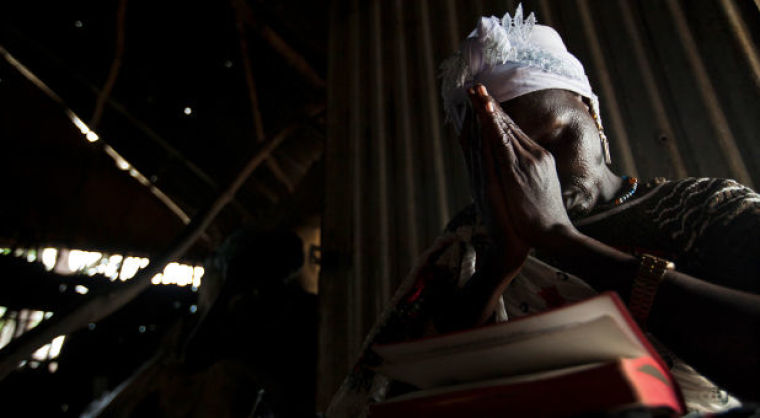
The verdict in the trial of three men detained for over a year in Khartoum – due today – has been postponed for another week – until 29 January.
Sudan Church of Christ leader Hassan Taour, Darfuri graduate Abdulmonem Abdumawla and Czech aid worker Petr Jašek were first detained in December 2015, alongside another Church of Christ pastor, Kuwa Shamal, who was released earlier this month.
Jašek faces charges of waging war against the state, violating restrictions in military areas, spreading rumours to defame the state, espionage, and inciting strife between communities, while Taour and Abdumawla face only the last two of these charges.
The court indictment specifically accused them of "fabricating videos or incidents of claimed genocide, killing of civilians and burnings of villages, besides claims of persecutions of Christians in Sudan".
Jašek was the first to be arrested, on 10 Dec., when authorities confiscated his computer, mobile phone and flash drives as he attempted to leave the country. Abdumawla, a single man employed in a mining exploration company in Khartoum, was arrested a week later. Then the next day, Taour and Shamal were arrested and held incommunicado for months, without charges or contact with their families.
All four were transferred to the Omdurman prison in early August 2016, then formally indicted before the Khartoum North Court on 21 Aug.
Court proceedings have at times been scheduled almost weekly, but postponed several times without warning when a witness, translator or the judge failed to appear.
In October, the European Parliament adopted an Urgency Resolution, calling for the "immediate and unconditional" release of the four men on trial "on charges of highlighting alleged Christian suffering in war-ravaged areas of Sudan".
The trial hearings were observed periodically by Western diplomatic observers, with local supporters gathering outside the court at times to sing hymns and shout encouragements to the defendants.
One observer at a hearing in November declared, "The prosecutor has nothing new. It was just a repetition of what has already been said... They didn't have any evidence to support their accusations."
In December, courtroom interrogations focused on allegations that a meeting Taour and Shamal had attended with other Sudanese church leaders in Ethiopia a month before their arrest was organised with political motives to "damage and tarnish" Sudan's international image.
While refusing to answer some questions posed by the defence lawyers, the NISS officer serving as the plaintiff in the case declared that "national security considerations" overrode several of Sudan's criminal procedure laws that had been violated throughout the past year.
The appearance of a witness, Ali Omer, on 12 Dec. was hailed as of "significant benefit" to the four men.
The young Darfuri man testified that he had been injured with severe burns during anti-government demonstrations at an Omdurman university in mid-2015. When he was left with serious injuries requiring regular medical care, his Darfuri friend, Abdumawla, had collected funds for his treatment from various organisations and individuals, including Taour, to cover these medical costs. Jašek was carrying electronic information and photos about Omer's situation when arrested. The defendants were accused of promoting Omer's case abroad to defame the government.
Background
Sudan is ranked fifth on Open Doors' 2017 World Watch List of the 50 countries in which it is most difficult to live as a Christian.
There has been no let-off by Sudan in its efforts to impose a unified Arab Islamic character over territories still under its government since the independence of the largely African Christian South in July 2011.
Both Taour and Shamal are from the Nuba people group, native to a border region with South Sudan, and among groups resisting ethnic and religious rule from Khartoum.
Sudan has previously used charges of "undermining national security" after prolonged detentions of Christians.
In May last year, the NISS released another Evangelical church leader after nearly half a year in detention. Despite his release, the file of Telahoon (Telal) Nogosi Rata, 36, remains with the Attorney General, who could yet decide to press charges.
A number of other Christian leaders face restrictions, including Ayub Tilyab, Yagoub Naway (both also SCC pastors), Philemon Hassan, and Yamani Abraha of Khartoum El Izba Baptist Church – all have been alternately arrested, released, and then made subject to daily NISS reporting.
In August 2015, Khartoum yielded to international pressure and released two South Sudanese pastors, whom it had accused of "spying". Yat Michael and Peter Yen were in prison for eight and seven months, respectively.
Similarly, Mariam Ibrahim, a Sudanese Christian, was released in June 2014 after she was initially sentenced to death for apostasy and flogging for "adultery".
On top of arrests, several church buildings have been confiscated or demolished, and the government has stated repeatedly that new church licenses will not be issued, leaving a number of congregations without a place of worship.
In October last year, five churches received notifications that their buildings would be demolished.
Earlier this month, a house belonging to the Bahri Evangelical Church, on the outskirts of Khartoum, was demolished by government officials.
The church has seen a number of its buildings damaged or demolished since 2013, when a committee imposed by the government (but not recognised by the church) sold part of its land to investors. In September 2015, a court ruled the committee was illegal.
Several of the church's members and leaders have been arrested and fined in recent years for protesting against the sale of their property.
Courtesy of World Watch Monitor
